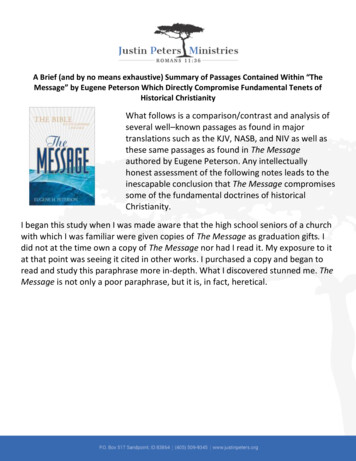
Transcription
A Brief (and by no means exhaustive) Summary of Passages Contained Within “TheMessage” by Eugene Peterson Which Directly Compromise Fundamental Tenets ofHistorical ChristianityWhat follows is a comparison/contrast and analysis ofseveral well–known passages as found in majortranslations such as the KJV, NASB, and NIV as well asthese same passages as found in The Messageauthored by Eugene Peterson. Any intellectuallyhonest assessment of the following notes leads to theinescapable conclusion that The Message compromisessome of the fundamental doctrines of historicalChristianity.I began this study when I was made aware that the high school seniors of a churchwith which I was familiar were given copies of The Message as graduation gifts. Idid not at the time own a copy of The Message nor had I read it. My exposure to itat that point was seeing it cited in other works. I purchased a copy and began toread and study this paraphrase more in-depth. What I discovered stunned me. TheMessage is not only a poor paraphrase, but it is, in fact, heretical.
Matthew 6:9New American StandardBible: 1995 Update9 “Pray, then, in this way:‘Our Father who is inheaven, Hallowed be Yourname.The King James VersionThe New InternationalVersion9 After this manner9 “This, then, is how youtherefore pray ye: Ourshould pray: “‘Our FatherFather which art in heaven, in heaven, hallowed beHallowed be thy name.your name.The Message9 With a God like thisloving you, you can prayvery simply. Like this: OurFather in heaven, Revealwho you are.This is a passage from what is commonly referred to as “the Lord’s Prayer.” Thereare two problems with Peterson’s rendering of this familiar verse. The first is thatPeterson includes an imperative from Jesus to the Father that is not in the text.The second, and much more serious, problem is the nature of His imperative –Reveal who you are. Why would Jesus Christ who is the revelation of God (Heb.1:1-3) ask God to reveal Himself? The Revelation of God is the One Who is prayingthe prayer! This imperative by Jesus certainly strongly implies that God has yet toreveal Himself. I beg to differ. Also, notice the room which is implicitly provided fora later revelation of the antichrist who will, of course, claim to be the revelation ofGod.John 10:30New American StandardBible: 1995 UpdateThe King James Version30 “I and the Father are 30 I and my Father areone.one.”The New InternationalVersion30 I and my Father areone.The Message30 I and the Father areone heart and mind.”This is another familiar passage. The NASB, NIV, and KJV are all practicallyidentical, save for the insertion of a personal pronoun found in the latter. Not soThe Message’s rendering. The Message denigrates the uniqueness and deity ofJesus. Let us remember that David was a “man after God’s own heart” (Acts 13:22)but he was not God.
1 Timothy 4:1-5New American StandardBible: 1995 UpdateThe King James Version1 But the Spirit explicitly 1 Now the Spiritsays that in later times speaketh expressly, thatsome will fall away from in the latter times somethe faith, paying attention shall depart from theto deceitful spirits andfaith, giving heed todoctrines of demons,seducing spirits, anddoctrines of devils;The New InternationalVersion1 The Spirit clearly saysthat in later times somewill abandon the faithand follow deceivingspirits and things taughtby demons.The Message1 The Spirit makes itclear that as time goeson, some are going togive up on the faith andchase after demonicillusions put forth byprofessional liars.Of the passages which I have cited in this letter, this is the least worrisome but isworrisome nonetheless. Paul is clearly referring to demonic powers but note theunmistakable human spin which Peterson employs. He diminishes the demonicpowers by referring to them as mere “illusions” which are forwarded not bydemons but by “professional liars.” Such a reference could encapsulate a carnivalbarker.Matthew 5:5New American StandardBible: 1995 UpdateThe King James VersionThe New InternationalVersionThe Message5 Blessed are the gentle, 5 Blessed are the meek, 5 Blessed are the meek, 5 You are truly blessedfor they shall inherit the for they shall inherit the for they shall inherit the when for they shallearthearthearthinherit the you arecontent with just whoearth you are – no more,no less.Not only does this not have anything to do with the passage at hand, it isstunningly un-biblical. What if a homosexual is reading this? Should he be contentwith “just who he is?” What about an agnostic? A Hindu? What about one whobelieves himself to be a “Christian” but is living in sin? This is not even true for aBible-believing, committed Christian! There should never be a time when we are“content with just who we are.” This is a profoundly unbiblical statement.
1 Corinthians 6:9-11New American StandardBible: 1995 UpdateThe King James VersionThe New InternationalVersionThe Message9 Or do you not know that 9 Know ye not that the9 Do you not know that the 9 Don’t you realize thatthe unrighteous will notunrighteous shall notwicked will not inherit the this is not the way to live?inherit the kingdom ofinherit the kingdom ofkingdom of God? Do not be Unjust people who don’tGod? Do not be deceived; God? Be not deceived:deceived: Neither thecare about God will not beneither fornicators, norneither fornicators, norsexually immoral norjoining in his kingdom.idolaters, nor adulterers, idolaters, nor adulterers, idolaters nor adulterersThose who use and abusenor effeminate, nornor effeminate, nornor male prostitutes nor each other, use and abusehomosexuals, nor thieves, abusers of themselves with homosexual offenders nor sex,nor the covetous, normankind, Nor thieves, nor thieves, nor the greedyGuess what’s missing?drunkards, nor revilers, nor covetous, nor drunkards, nor drunkards norswindlers, will inherit the nor revilers, norslanderers norkingdom of God. Suchextortioners, shall inherit swindlers, will inherit the 10. Use and abuse thewere some of you; but you the kingdom of God. And kingdom of God. And that earth and everything in it,don’t qualify as citizens inwere washed, but yousuch were some of you:is what some of you were.were sanctified, but you but ye are washed, but ye But you were washed, you God’s kingdom. 11. Awere justified in the name are sanctified, but ye are were sanctified, you were number of you know fromof the Lord Jesus Christ and justified in the name of the justified in the name of the experience what I’mtalking about, for not soin the Spirit of our God.Lord Jesus, and by theLord Jesus Christ and bylong ago you were on thatSpirit of our God.the Spirit of our God.list. Since then, you’vebeen cleaned up and givena fresh start by Jesus, ourMaster, our Messiah, andby our God present in us,the Spirit.This one is serious. One of the sins to which the Apostle Paul is clearly referring isthat of homosexuality. Notice that The Message completely omits the word. In itsstead, Peterson inserts the phrase “those who use and abuse the earth.” Theearth? From where in the world (or the text as the case may be) did he get theearth? There seems to be an environmental agenda at work here. One could notread this passage in a real Bible and come away believing that homosexuality waspermissible under any circumstances. One would never know from reading TheMessage, however, that it was a problem in any sense.
Romans 1:26-27New American StandardBible: 1995 UpdateThe King James Version26 For this reason God 26 For this cause Godgave them over togave them up unto viledegrading passions; for affections: for even theirtheir women exchanged women did change thethe natural function for natural use into thatthat which is unnatural, which is against nature:and in the same wayAnd likewise also thealso the men abandoned men, leaving the naturalthe natural function ofuse of the woman,the woman and burned burned in their lust onein their desire towardtoward another; menone another, men with with men working thatmen committing indecent which is unseemly, andacts and receiving inreceiving in themselvestheir own persons thethat recompence of theirdue penalty of their error. error which was meet.The New InternationalVersionThe Message26 Because of this, God 26 Worse followed.gave them over toRefusing to know God,shameful lusts. Eventhey soon didn’t know howtheir women exchanged to be human either—natural sexual relations women didn’t know howfor unnatural ones. In the to be women, men didn’tsame way the men also know how to be men.abandoned naturalrelations with women27 Sexually confused, theyand were inflamed with abused and defiled onelust for one another. Men another, women withcommitted shameful actswomen, men with men—with other men, andall lust, no love. And thenreceived in themselvesthe due penalty for their they paid for it, oh, andreceived in themselves theerror.due penalty for theirperversion. how they paidfor it— emptied of Godand love, godless andloveless wretches.This passage dealing with homosexuality is quite a bit more problematic forPeterson. In 1 Cor. 6:9-11, he had only to omit one word. Here, he has two entireverses with which to wrestle. What to do here? Well, Peterson provides a loophole:all lust, no love. The not-so-subtle insinuation is that ‘Well, if these people had justdone this out of love, then it would have been ok.’ There is clearly in The Messageroom for a ‘committed, loving’ homosexual relationship. In Peterson’s rendering ofthe Bible, it is not the nature of homosexuality in and of itself that is the grievoussin, it is simply the absence of love.
1 Timothy 1:10New American StandardBible: 1995 UpdateThe King James Version10 and immoral men and 10 For whoremongers,homosexuals andfor them that defilekidnappers and liars and themselves withperjurers.mankind, formenstealers, for liars.The New InternationalVersion10 for adulterers andperverts, for slavetraders and liars andperjurers.The Message10 but for theirresponsible, who defyall authority, ridingroughshod over God,life, sex, truth, whatever!The Message again simply leaves out the reference to homosexuality and replacesit instead with the generic “sex.” Inexplicably, the NIV appears to do the same.There are 3 passages in the N.T. that deal with homosexuality and The Messageutterly fails on all three.Note: The Message does, in fairness, appear to be relatively on track in regards toLeviticus 18:22. This, though, does not excuse its abject failure in the N.T. Let’s behonest, how many people (teenagers especially) are realistically going to dodevotional reading from Leviticus? They are far more likely to spend their time inthe New Testament.
Romans 8:35New American StandardBible: 1995 UpdateThe King James VersionThe New InternationalVersion35 Who will separate us 35 Who shall separate 35 Who shall separatefrom the love of Christ? us from the love ofus from the love ofWill tribulation, orChrist? shall tribulation, Christ? Shall trouble ordistress, or persecution, or distress, orhardship or persecutionor famine, or nakedness, persecution, or famine, or famine or nakednessor peril, or sword?or nakedness, or peril, or or danger or sword?sword?The Message35 Do you think anyoneis going to be able todrive a wedge betweenus and Christ’s love forus? There is no way! Nottrouble, not hard times,not hatred, not hunger,not homelessness, notbullying threats, notbackstabbing, not eventhe worst sins listed inScripture:This one really is troublesome. Notice that all of the elements which Paul rightlyasserts will never separate us from Christ are very earthly and temporal(tribulation, persecution, famine, etc.). Paul is basically talking about hard times.Eugene Peterson brazenly inserts into the passage: not even the worst sins listed inScripture. Wow. This should trouble any clear thinking believer. Sin IS whatseparates us from God! That is why we need a Savior! For the one who is lost, sinseparates from God positionally. For the believer, sin separates from Godrelationally. Sin is not even remotely in view in this passage. This is heresy.Conclusion:Pick up a copy of The Message and you will see on its front cover “The Bible inContemporary Language.” The Message is NOT the Bible. It is one man’s commentary onthe Bible, and an extraordinarily poor one at that.Some object to criticism of Peterson’s work by saying The Message is not a literaltranslation but rather a paraphrase. True. But even paraphrases should be anaccurate thought for thought rendering of the original biblical text. We are nottalking here about a paraphrase of “Green Eggs and Ham.” We are talking aboutthe Word of God. God holds His name and His word above all things (Psalm 138:2).His Word must be rendered and handled accurately. What we believe about God is
derived from what we read in His Word. If one reads an erroneous Bible, then itlogically follows that what one believes about God will also be in erroneous.The Message is, in large part, marketed toward teenagers, young adults, andyoung believers – the most impressionable among us. Youth ministers are readingthis to their students and teaching from it. Many preachers are, sadly, quoting it intheir sermons. Hopefully, much of this is being done in ignorance.The question must be asked, ‘Would Jesus Christ approve of this rendering of Hisword?’ Certainly any honest intellectual assessment would have to lead one to theanswer of an emphatic “No.” If Christ would not approve then certainly we mustnot either.We must also keep in mind that it is neither Mr. Peterson’s intentions nor hissincerity which is important. In fact, they are irrelevant entirely. Peterson may wellbe sincere. Sincerity, though, is not the issue – Truth is the issue. Misplacedsincerity is a profoundly dangerous commodity.If you own a copy of The Message, you may be wondering, ‘Well, what do I do withit?’ Use it for kindling, target practice, a level for your RV, but just please, pleasedo not sell it in a garage sale or give it away to someone. The last thing we want todo is pass it on to another unsuspecting person who could be led astray by itsheresies.So, what Bible should you use? There are, essentially, two genres of Bibletranslations, or, two approaches to the work of transferring the original Hebrew,Aramaic, and Greek texts into another language which, if you are reading this, is,of course, English. The first of these is known as Formal Equivalence. This approachrepresents a commitment to, as much as possible, present a “word for word”rendering of the original biblical texts. A strict word for word translation is nottruly possible because the biblical languages are structured far differently thanEnglish or any other modern language. Nonetheless, translations produced underthe approach of Formal Equivalence will attempt to provide an accurate renderingof the original texts. Formal equivalent translations are literal translations.The other approach is that which is known as Dynamic Equivalence. DynamicEquivalent translations are not word for word but are more “thought for thought.”
Some of these translations are even more “sentence for sentence.” In otherwords, the objective is not to give us an exact rendering of the original languages,but more the essence of what they mean. The danger of this is that suchtranslations inevitably slide into at least some degree of interpretation, opinionand conjecture - if not even personal bias. Dynamic equivalent translations aresometimes referred to as paraphrases.I am philosophically and theologically committed to literal translations because Iwant to know what the original text says. I do not want to read a Bible that hasalready passed through the filter of others’ personal opinions and/or agendas.Now, not all translations in either of these camps are equally good or bad. There isa continuum along which they fall. Some literal translations are more literal thanothers. Similarly, some of the paraphrases are more paraphrastic than others. Forexample, the NIV is a literal paraphrase, if you will, but still it is a paraphrase. I useand study from the KJV, NKJV, ESV, and the NASB. It is good to have two or threeliteral translations at hand. However, I tell people that if I were stranded on adeserted island and could have only one Bible for the rest of my days, it wouldwithout a doubt be the NASB. The NASB is my go-to Bible for it is, in most scholars’opinions, the English translation which is the most literal. Is it perfect? No – notranslation is. With certain verses the KJV and ESV renderings are a bit clearer. Infact, there are a few verses in which even the NIV’s rendering might be preferred(but very few). All in all, however, if I had to recommend one over all others, itwould be the NASB.The following graph may help to give you a better “birds eye view” of some oftoday’s more popular translations and where along the line they would fall.I would also recommend that if you do not already have one, get a good study
Bible. The two I would recommend are (in order of enthusiasm) the JohnMacArthur Study Bible (www.gty.org) and the ESV Study Bible.In Him and for His Truth,Justin Peterswww.justinpeters.org
New American Standard Bible: 1995 Update The King James Version The New International Version The Message 9 Pray, then, in this way: Our Father who is in heaven, Hallowed be Your name. 9 After this manner therefore pray ye: Our Father which art in heaven, Hallowed be thy name. 9 This, then, is how you should pray: Our Father in heaven, hallowed be










